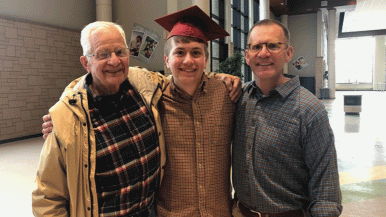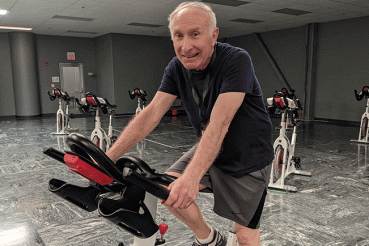John Scambler, DDS, could sense that something wasn't right: For about two years, he'd had an intermittent sore throat and an earache. His otolaryngologist (ENT) treated a fungal infection in his left ear, but the earache remained. He saw a friend who was an orthodontist and thought the problem might be with Scambler's temporomandibular joint; but that treatment didn't help either.
Scambler had a lot of other things on his mind at that time, as he was the primary caregiver for his wife, JoEllen, who had Alzheimer's disease. "I put myself on the back burner," he remembers.
After JoEllen died in 2017, Scambler turned his focus to his own health. His ENT eventually performed a throat biopsy, which resulted in an unusual diagnosis: adenocarcinoma of the oropharynx. "This is a very rare tumor that originates in the salivary glands and is located deep at the base of the tongue," says Samer Al-Khudari, MD, a Rush specialist in transoral robotic surgery (TORS) who treated Scambler. "In fact, it's so rare that the ideal treatments aren't necessarily clear — but as a team, we did a lot of research to find out what we could offer Dr. Scambler."
An unusual tumor, a high-tech approach
Al-Khudari became Scambler's surgeon thanks to Rush's multidisciplinary approach to head and neck cancer: After Scambler was referred to Rush otolaryngologist/head and neck surgeon Kerstin Stenson, MD, she brought Scambler's case to the head and neck cancer team — which meets weekly and includes a radiation oncologist, a medical oncologist and a radiologist as well as other head and neck surgeons — to come up with a plan.
"The goal is not just survival, but survival and function," Stenson says. "We prioritize both of those equally in a patient who has newly diagnosed head and neck cancer."
A retired dentist, Scambler knows head and neck anatomy well, so he was an especially informed participant in his care, says Al-Khudari. "When we met with Dr. Scambler, we decided that we'd do TORS first to get a look at this unusual tumor, and then we could decide on further treatment after the surgery," he says. "Sometimes robotics help remove cancer; sometimes it's just to find and visualize it. Every patient's disease, location and surgery goal is different, so we want to make sure we cover all possible options."
Scambler didn't hesitate about having TORS: "I thought it was a great plan."
TORS uses a 3D camera to visualize a tumor, and two surgical robot arms — one to grasp and one to cut — that enable the surgeon to cut away a tumor and remove it through the mouth. The robot's small, delicate arms are able to access areas far back in the mouth and throat that hands can't reach, so it allows for minimally invasive surgery. In Scambler's case, the alternative would likely have been mandibulotomy, or splitting the lower jawbone to expose the base of the tongue — an extremely invasive surgery from which recovery can be difficult.
Scambler had his surgery just after Christmas in 2017. First, Al-Khudari used the camera to get a good look at the tumor; then, he removed it along with a margin of surrounding tissue to ensure that all the cancerous cells were gone. After the tumor was removed, Al-Khudari also performed a neck dissection, or removal of the lymph nodes, to look for signs that the cancer had spread. Happily, the results showed no cancer in the nodes.
'I'm doing great'
After the surgery, Scambler and his care team met to talk about whether further treatment was needed. "The tumor was confined to the tongue," Al-Khudari says, "and as a team we considered chemo and radiation, but we weren't convinced either one was needed."
Instead, Al-Khudari decided to watch Scambler closely for any signs of recurrence — an approach with which the patient was completely on board, especially after seeing the experience of a friend who had radiation for throat cancer and required a feeding tube. "I was 81 at the time and thought it would be wiser to take the life that surgery alone would offer, rather than go into radiation and give up a year of my life," he says.
Scambler's recovery wasn't a total walk in the park — "I couldn't eat for a few days, and I was physically out of it for a few weeks" — but after 10 days he was able to leave the hospital without a feeding tube, and his speech and swallowing weren't permanently affected. "He's an independent guy," Al-Khudari says, "and one of my primary concerns was that he not lose that independence and function."
Today, Scambler sees Al-Khudari quarterly at Rush Oak Brook, an easy trip from his home in Mt. Prospect. He remains cancer-free and has returned to his active life of gardening, hiking, handball, and volunteering with support groups for caregivers of Alzheimer's patients.
"I'm doing great. I don't know how the whole thing could have gone any better," he says. "Everyone I talked to at Rush was compassionate, competent, careful and caring — I'm just really impressed with the people at all levels. They knew exactly what to do. All along, everybody knew it was a difficult time for me and had my best interest at heart."




